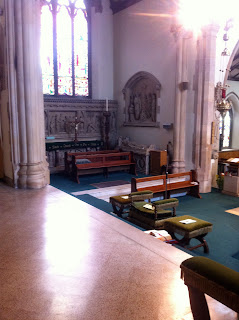The penny began to drop for me when I paid my first visit to Fontgombault Abbey in about 1984 or 5. It was late December, and there were some very hardy scouts in their blue uniforms camping in the grounds. Several of them would attend every office in the freezing church, dressed only in their uniforms (shorts!) without even a jacket. A few even came to Matins, long before dawn. What struck me most forcibly was the devout way these teenagers made the sign of the cross; not the hasty dabs made by other nations, but a slow, reverent, deliberate and beautiful gesture.
It seems that France is a country where it is very hard to do anything half-heartedly; its extremes are very important and held to tenaciously. Again, at Fontgombault, I was struck by the fact that in the monastery there were then at least sixty priests. But in the village, quarter of a mile from the monastery gates, there was a parish church which had to share a single priest with umpteen other churches. It would not occur to the monks for one minute to celebrate Mass for the parish, nor would it occur to more than one or two of the parishioners to attend one of the vast array of daily Masses in the Abbey. The secular priesthood is in a bad way in many parts of France, but the monasteries, not just the traditional ones, are thriving.
In other words, in France you can certainly find the worst, and the worst is very bad. But you can also find the best, and the best is really wonderful. And there are always surprises.
Take Paris, for instance. Given the nature of a capital city, and the state of the faith outside, in, say, the diocese of Sens-Auxerre, one might assume that the faith in Paris would be in pretty bad shape. But not at all; in fact, the diocese of Paris would appear to flourish enviably. I hear that the seminaries are doing relatively well. New movements exist here and there and keep the prayer life going. I visited Paris a few weeks ago, and each Mass I attended, including on weekdays, there was a substantial congregation. I never saw rubrics violated; priests were properly vested and said Mass devoutly. I saw extraordinary ministers of Holy Communion at Notre Dame, ( the congregation was huge and in terms of Canon Law their use might be said to be justified); the ministers were all men, wore suits and ties and behaved very properly and reverently. The only disedifying thing I saw was at Sacre-Coeur; a worshipper had presented him or herself at Communion time and asked the priest for a blessing instead of Communion. Well, the priest indignantly refused and, holding the Blessed Sacrament, roundly told the person off. Then, before giving the blessing, he went off on one (as my secretary would say) and harangued us all saying that if we weren't fit to receive Communion, we shouldn't be in church at all, that we polluted the very air with our foul sinful breath. It was really dreadful, and I felt deeply for the poor individual who had inadvertently sparked off this intemperate diatribe. My ear for French accents isn't that great, but I think the priest might have been Polish.
The highlight of my visit to Paris was unquestionably the feast of the Assumption. I attended Mass at Notre Dame, celebrated by Cardinal Ouellet. The music was Gregorian chant sung by a small (unsatisfactorily amplified) schola, who took the modern Marcel Pérès approach. It was very effective. Everything was done splendidly and, to my great surprise there were two (two!) processions in honour of our Lady on each evening; on the eve of the feast by boat around the islands, and a walking procession on the day itself. There were huge crowds participating—again to my edification and surprise.
I know very well that France still has massive problems with too few (and sometimes unbelieving) clergy, hopeless bishops, lacklustre liturgies, dying active orders of religious, arrogant modernists and the rest. But there is a great deal of energy, too; it just does not tend to be linked up with the hierarchy yet. Sooner or later, the hierarchy are going to realise that it is in these otherwise despised groups that all the future of the Church is to be found. And then it will have to come to terms with them. But they are very strong, and because of this gallic love of polarised and strong positions, they will put off the evil day for as long as possible. And meanwhile the Fontgombaults, the Communities of Jerusalem, the Communities of St Jean and the like will continue to grow and send out foundations as in the past.
We need something like this in the British Isles, but without that indomitable spirit that the French have, I doubt we will achieve it. The community of St John have already made a foundation in London. Its methods are unlikely to transfer to the English, any more than happened in the past; but their presence is very welcome and may truly inspire some good growth in this land.
You see, il faut que la France survive!











